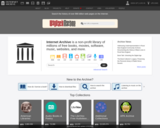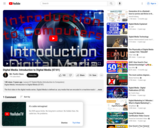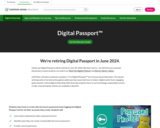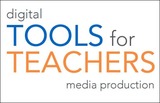
Internet Archive is a non-profit library of millions of free books, movies, software, music, websites, and more.
- Subject:
- Education
- Material Type:
- Primary Source
- Date Added:
- 10/13/2020

Internet Archive is a non-profit library of millions of free books, movies, software, music, websites, and more.

Digital literacy frameworks for Canada divided into the age groups: K-3, 4-6, 7-8, 9-12.
USE, UNDERSTAND & CREATE: A Digital Literacy Framework for Canadian Schools - this document provides an overview and the big picture of digital literacy.
When you click each grade level a series of lessons will be accessible. These are fabulous lessons and all materials are provided.

Geographic information systems (GIS), once used predominantly by experts in cartography and computer programming, have become pervasive in everyday business and consumer use. This unit explores GIS in general as a technology about which much more can be learned, and it also explores applications of that technology. Students experience GIS technology through the use of Google Earth on the environmental topic of plastics in the ocean in an area known as the Great Pacific Garbage Patch. The use of this topic in GIS makes the unit multidisciplinary, incorporating the physics of ocean currents, the chemistry associated with pollutant degradation and chemical sorption to organic-rich plastics, and ecological impact to aquatic biota.

The first video in the digital media series. Digital Media is defined as: any media that are encoded in a machine-readable format. It can be created, viewed, distributed, modified and preserved on computers.
In this lesson we will look at the following:
-Digital Publications
-Digital Audio
-Digital Graphics
-Digital Photography
-Digital Video

We continue our look at digital media with digital publications. We examine eBooks, self publishing, two great authors, the death of traditional newspapers, blog and microblogs.
Links from Video:
-http://www.createspace.com/
-http://www.lulu.com/
-http://jlbourne.com/
-http://monsterhunternation.com/
-https://wordpress.com/
-https://www.tumblr.com/
-https://www.facebook.com/mrfordsclasslearning
-https://twitter.com/mrfordsclass

Part 1 of 2 focusing on digital audio. This is part of our Introduction to Computers - Digital Media lessons.
This lesson looks at:
-Sampling Rate
-Bit Depth
-Mono/Stereo/Surround
-Recording formats

Part 2 of 2 focusing on digital audio. This is part of our Introduction to Computers - Digital Media lessons.
This lesson looks at how we get audio into and out of the computer:
-Sound cards
-Microphones
-Audio editing software
-Speaker configurations
Links from Lesson:
-http://grooveshark.com/
-http://www.jango.com/
-http://www.pandora.com/
-https://www.spotify.com
-http://www.iheart.com/
-http://audacity.sourceforge.net/

Video 5 of our Digital Media, Introduction to Computers series. In this video we look at digital imagining.
Topics covered:
•Color Modes
•Image File Format
•Digital Cameras
•Image Quality
•Image Editing Software
•Online Photo Albums
Links from Video:
•https://www.flickr.com/
•http://picasa.google.com/
•http://www.shutterfly.com/
•http://www.smugmug.com/
•http://www.tomsguide.com/us/dslr-vs-mirrorless-cameras,news-17736.html
•http://www.gimp.org/

The last video in our digital media series from Introduction to Computers.
This video looks at the basic of digital video including: frame rate per second, SD/HD, pixels, aspect ratio, things to look for when buying, streaming video, and video editing software. We also give out digital media picks.
Links from Video:
-http://www.videomaker.com/
-File Format http://bit.ly/1m5gMVM
-http://www.hulu.com/
-http://vimeo.com/
-https://www.netflix.com
-http://www.ustream.tv/
-http://audacity.sourceforge.net/
-http://www.mediacollege.com/
-http://www.bhphotovideo.com/

Digital Nation is a new, open source PBS project that explores what it means to be human in an entirely new world -- a digital world. It consists of this Web site as well as a major FRONTLINE documentary to be broadcast on Feb. 2, 2010. Our production team is posting rough cuts and raw footage on the web, and gathering input, feedback and stories from users as we go.

"Introduce students in grades 3–5 to Digital Passport™ by Common Sense Education. The award-winning suite of six interactive games addresses key issues kids face in today's digital world. Each engaging game teaches critical digital citizenship skills that help students learn to use technology responsibly to learn, create, and participate. Games are available in Spanish."
Learn about passwords, online safety, sharing private information online, cyberbullying, how to search and more - all by playing games.
A complete educator guide is available.

Photography, as a nonverbal language, allows students to increase their visual perception and provides a medium for creative expression. The history of photography will be evaluated in the context of historical, social, cultural and artistic developments. Students learn to understand the artistic qualities of the photographic medium while acquiring the techniques for utilizing photography for expressive purposes. Instruction includes studio and field techniques, photojournalism, fashion photography, and commercial, portrait, scientific, nature, wildlife and sports photography. In producing their own works and by studying the photographs of others, students will develop a base for making informed aesthetic judgments. Integrated throughout the course are career preparation standards which include basic academic skills, communication, interpersonal skills, problem solving, workplace safety, and technology and employment literacy.

A photography website that has an indispensable amount of resources for teachers and students learning about photography.
There a many 'How To' articles for various techniques on taking photographs. There are many articles that give helpful tips and hints, as well as a lot of DIY techniques that can be cost effective. Any questions about equipment: what to buy or what you would need them for, there are lots of articles that help with that.
It is also a helpful website that gives help with post production work in Lightroom and Photoshop.
The website is often updated as there are weekly posts with new articles and project ideas.
If you sign-up, you can have the option of having project ideas and articles emailed to you.

Learn the basics of how to take great pictures with your digital camera or mobile device.

Help your students to get organized by keeping all their materials and resources for your subject in this digital portfolio. The downloadable template provides tips, tricks and lots of examples to get you and your students started documenting their learning journey. You provide the template to the students so they can implement what they have learned during the class, semester or year.
Create a free account (use your Google sign in) to have access to this great resource!

Striking images can leave lasting impressions on viewers. In this lesson, students make text-self-world connections to a nature- or science-related topic as they collaboratively design a multimedia presentation.

This book starts with a very brief development of signals and systems. It then develops the characteristics and the design of finite impulse response (FIR) digital filters. That is followed by developing the characteristics and the design of infinite impulse response (IIR) digital Filters.

Teachers are always looking for tools to make their lives
easier. And so are we. That?s why the Global Digital
Citizen Foundation created this ebook series called ?Free
Tools for Teachers.?
In this volume, we feature free tools for doing digital
media production. You?ll find some of the best free
resources on the Web for video editing, photo editing, and
also podcasting.
Explore these great free online tools we?ve picked just for
you, and have fun learning!

Teachers are always looking for tools to make their lives easier. And so are we.
That?s why the Global Digital Citizen Foundation created this ebook series called
?Free Tools for Teachers.?
In this volume, we feature free tools for writing, blogging, and websites. Check out
some of the best free resources on the Web for digital storytelling, creative writing,
blogging, and also great tools for building free websites.
Explore these great free online tools we?ve picked just for you, and most of all,
have fun learning!

Students in Grades 2-6 use digital dictionaries and other e-book tools to learn new vocabulary as they read e-books on digital reading devices.